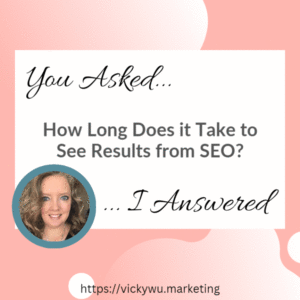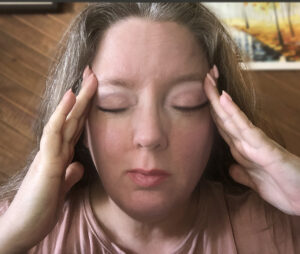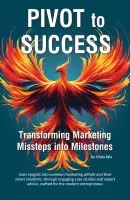
How Long Does it Take to See Results from SEO? | Marketing Q&A
Wondering how long SEO takes to show real results? Learn about the key factors that impact your SEO timeline, common...
Read More
I saw a self-proclaimed SEO pro share this really BAD SEO advice … and I cringed. Some days I wonder how some of these self-proclaimed “experts” stay in business with the bad advice I see.
Quite often, it’s a prospective client, or an entrepreneur in one of the places I hang out and share advice or answer questions from time to time, who wants to know about advice they’ve been given by someone else. And I tell them it’s bad, and why.
But today … SMH … y’all today I saw a post about SEO from one of these self-proclaimed SEO “experts” (fakexpert) come across my timeline on social media. They shared this really bad tip right on their own profile, which is going out at least to their 1500 followers or so (and this is just to point out, the number of followers someone has doesn’t mean they’re an expert!)
I follow various topics and hashtags to keep up with industry news, so it’s not uncommon that in addition to highly reputable sources I follow, someone else will come across my feed.
This particular advice made me want to add a comment and explain exactly why it was bad advice.
BUT …
I don’t like to be negative online, I really don’t like to call people out publicly, I don’t like to do anything that might feel like personally attacking someone. But the advice was SO bad I also didn’t want any entrepreneurs who follow her to follow this advice and get penalized by GOOGLE!
I did, however, send her a private message letting her know that the advice can actually get a website penalized. I hope she is wise enough to stop and listen.
The bad advice goes something like this:
“How to organically improve your SEO: Create hidden pages. Google loves fresh content and will favor websites with more content. Make hidden pages just for SEO purposes and load them with keywords. The key is to research.”
Signed, What Not To Do
I hesitated even adding those words to my website! (I was debating adding it as an image instead, which search engines can’t easily read), but then I considered that some people may have seen similar advice and be searching for further information on the topic, and I realized I could help educate my current and future audience with correct information.
So let me break down for you some of the ways this advice is wrong.
 Back in 2011, Google released their “Panda” update, which caused a LOT of turmoil in the world of businesses that had been using questionable SEO, some strategies that up until that point could make a positive impact on your search result placement just by gaming the algorithm.
Back in 2011, Google released their “Panda” update, which caused a LOT of turmoil in the world of businesses that had been using questionable SEO, some strategies that up until that point could make a positive impact on your search result placement just by gaming the algorithm.
Keyword stuffing is one of those outdated bad tactics. The bad advice I’ve heard a fakexpert share is: “Stuff your page with as many keywords as possible for better SEO.” This might have worked over a decade ago, but today, keyword stuffing is a surefire way to hurt your site. Google’s algorithm is much more sophisticated now, and it rewards high-quality, user-focused content over keyword density.
The Panda update penalized websites that relied on low-quality content that was stuffed with keywords. I remember some businesses that I was tracking, ones that I considered were doing questionable strategies and was curious to track how badly they fared, and saw the negative impact they felt due to this update. A couple of them dropped so far in search results that I could barely find them.
So for 10 years now, it’s been terrible advice to load a page with a lot of keywords for no purpose other than to try to rank for those keywords.
Keep in mind though, if you have a page that happens to have quite a bit of copy around one topic, and it ends up loaded with keywords in the course of naturally writing for your audience, Google won’t otherwise penalize the website if the content is exceptional. Keywords themselves aren’t bad. Stuffing unnecessary keywords is.
Instead of keyword stuffing, think about your user’s experience. Are they getting value from your content? Are you answering their questions in a clear, straightforward way? Google is looking at how users interact with your site—if people come to your page and quickly leave, Google will know that your content isn’t helpful.
But adding keywords simply for the sake of having keywords … that won’t help your SEO and over the long term could even resulting in your page, or your entire site, not being shown as frequently as websites that have quality information.
Vicky's SEO Rule #1: always write for your audience. This does mean doing research to understand what keywords and terms they will be searching for ... but it also means using those naturally with a good flow in your content. #seo #entrepreneur
Vicky Wu Marketing Tweet
Another piece of bad advice I’ve seen is: “Only use a specific keyword on one page of your website, or Google will penalize you.”
This is simply not true.
Search engines do not penalize you for using a keyword multiple times unless you’re stuffing as mentioned above. In fact, using your primary keyword throughout your content is crucial for SEO—it helps Google understand what your page is about.
The key is how you use it. You should integrate your keyword naturally, ensuring your content reads smoothly and offers value to your readers.
Think of it like having a conversation. If you’re talking about puppies, it makes sense to mention “puppies” several times, right? Just like I share advice about marketing, and imagine if I never used the word marketing in any subsequent articles!
That’s exactly how it works with your website content too. Just make sure that the keyword usage feels organic, and don’t try to force it in where it doesn’t fit.
One particularly common misconception is: “You should only use exact match keywords to rank well.” Rigidly sticking to one version of a keyword makes your content awkward and less readable.
Google has evolved to understand semantic meaning and related keywords. You don’t need to use the exact phrase repeatedly. In fact, doing so can make your writing feel stilted and unnatural, which will turn readers off.
Instead, embrace variety—use different variations of your keyword and consider the broader context of your content.
LSI Keywords: Use Latent Semantic Indexing (LSI) keywords—these are simply related terms that Google expects to see alongside your main keyword.
For example, if your keyword is “SEO strategy,” related terms might be “digital marketing,” “content optimization,” or “search engine ranking.” This adds depth and context to your writing.
More importantly, it helps your audience understand and find what they’re looking for, which should be your primary goal.
Google’s Latest Updates Focus on Your Audience
 Like the advice the fakexpert shared with her followers.
Like the advice the fakexpert shared with her followers.
The advice I heard was this: “Create hidden pages just for SEO purposes and load them with keywords.”
There’s a few reasons why this is just not solid information.
First of all, Google actively discourages any attempts to deceive its algorithms, and creating hidden pages just to manipulate rankings is a classic example of black hat SEO. If Google detects that you are trying to game the system, you could face severe penalties, including getting your website removed from search engine results entirely.
And, more importantly again about your audience, why in the world would you want to write content that your audience doesn’t see?
Granted, if they do a search and somehow your hidden page were to show up in Google results, they can still click on the link shown and read the information.
Which means that it needs to be good information that is valuable to your audience. In which case, why in the world would you want that information to be hidden on your website?
There’s no point in writing crap copy.
If you write an article that’s stuffed with keywords and somehow Google doesn’t block it, and someone actually clicks on it and reads it … they’re going to leave your website because what you’ve given them is CRAP. Then, in the future, they see your name again and they probably won’t even bother to click, because they’ll remember you and relate you to crap.
Copywriting, even crap copywriting, takes time, resources, perhaps even money if you hire a copywriter. You’re going to expend the resources whether you’re writing crap copy or copy that is valuable to your audience. So use those resources to write something good, in which case, why would you want to use those resources, produce something GOOD, and then not actually make the information available to your *existing* audience?
Vicky's SEO Rule #2: Don't waste time or money writing keyword-stuffed crap. Your audience wants and needs valuable information. #seo #entrepreneur
Vicky Wu Marketing Tweet

Another piece of bad SEO advice I’ve seen floating around is: “Avoid linking to other pages on your own website, as it will confuse Google.”
What?! Actually not doing so will confuse Google, AND your audience.
One of the most effective strategies you can use on your own website content is interlinking related content.
We offer varying levels of SEO services, and with a few clients we oversee blog writing, posting and reposting those blogs on social media, integrating that with a little PPC advertising (and in many cases other marketing services as they need). For these clients where we are either doing, or overseeing, several related aspects of their marketing, we can closely track how all of their content works together, which means we can optimize the entire workflow for integration and all of the pieces working together for better results..
For those clients, we can tightly track a social media post that is published, how many clicks to the article on the website that results in, and from there where they go next. Perhaps that’s another related article on the same topic … which keeps the reader on the website longer … and that signal is seen by Google. If your audience stays on the website longer, it’s likely because you have good information that is keeping them around. Right?
Or, we can track when the content takes them further, into a conversion into a paying customer. (We have methods and systems for all of this for our SEO and content clients).
But … if you have a page of content that is not connected to anything else, no incoming links from other pages pointing to it, and it not having any links on it to other pages, that flow and conversion doesn’t happen as easily. This is what makes a page “hidden” … and also what makes it ineffective.
Strategic interlinking can help you overall in search results. We have data that proves it. And interlinking is one of the content audits we undertake regularly, to make sure that we can update existing content with some more appropriate or newer links periodically.
Vicky's SEO Rule #3: Interlink related content to help your audience find other helpful information on your #website. #seo #entrepreneur
Vicky Wu Marketing Tweet
 Just like there is little point (and almost non-existant ROI) to using your precious resources to write copy that is only for Google, and is stuffed with keywords which just feels awkward to your audience, if you’re only creating this content for it to never be used, then you’re also missing out on the opportunity to share it, and to reshare it.
Just like there is little point (and almost non-existant ROI) to using your precious resources to write copy that is only for Google, and is stuffed with keywords which just feels awkward to your audience, if you’re only creating this content for it to never be used, then you’re also missing out on the opportunity to share it, and to reshare it.
One signal that boosts a page up in the search results is how much traffic the page is receiving from third-party platforms, such as social media. The only way you can get traffic to the page from there is to either share it yourself, or for someone else to share it. Otherwise, the platforms like Facebook or Twitter don’t know, and don’t care, that the content exists. No one visiting the page from these other sources and you’re missing out on this signal.
Again, we have data that proves that sharing your content, and then curating it strategically and sharing it again, helps boost traffic and SEO signals not just for that piece of content, page or post, but for your entire website.
Vicky's SEO Rule #4: Share your content and share again. It takes your audience 11 times seeing content before they're aware it exists. #seo #entrepreneur
Vicky Wu Marketing Tweet
One of the worst pieces of advice I’ve seen floating around from the fakexpert is to focus solely on keywords and ignore other things like user experience(UX).
UX and SEO go hand in hand—Google wants to rank pages that offer the best experience to users. If your website is slow, cluttered, or difficult to navigate, it doesn’t matter how well-optimized your keywords are; you’re still going to struggle to rank.
SEO is constantly evolving, yet some fakexperts still advise people to stick to outdated tactics like aiming for a specific keyword density percentage or stuffing meta tags with keywords.
While meta tags are still important, they should be written with users in mind, not just search engines. Google doesn’t really use them like they used to. Today’s best practices involve creating compelling titles and meta descriptions that entice users to click through to your site.
Another old tactic people used to use which is now a “grey hat” strategy – meaning Google may not directly penalize you but it can still harm your results – was to have multiple websites for your business. I wrote about a client that we helped consolidate numerous websites to get better SEO results.consolidate numerous websites to get better SEO results.
Google’s algorithm has evolved significantly, and its focus is on user behavior—if people click on your link and stick around, that tells Google your page is worth ranking.

 In the case of the example above, the entrepreneur who shared the post about hiding content happens to be a copywriter. She’s actually decent at writing copy from what I have seen of her work.
In the case of the example above, the entrepreneur who shared the post about hiding content happens to be a copywriter. She’s actually decent at writing copy from what I have seen of her work.
However, based upon this tip she shared (the first SEO-related tip I’ve ever seen her share anywhere), which said it was #1 in a series of more, she’s definitely not an SEO expert.
But would you know this by simply seeing this one post? Probably not.
If I need surgery, I’m probably not taking advice from my lawyer. Or from my hairstylist. Or my housekeeper. Or my accountant. All of these people are experts in their fields, but they are not experts in all fields.
Sometimes copywriters do need a basic understanding of SEO as it relates to writing (if they write copy for a website), although an SEO expert can work with a separate copywriting expert pretty seamlessly (we’ve polished that coordination for a few of our clients who have someone already performing copywriting but still need the SEO piece performed by us). However, just because they are an expert copywriter and understand some of how that needs to incorporate pieces of SEO, although like I’ve mentioned multiple times an audience-first approach is still the best way to write, it doesn’t mean they know SEO.
Bad SEO advice is everywhere, but that doesn’t mean you need to fall for it. The key takeaway here is to prioritize quality content and user experience over outdated SEO hacks. Use keywords naturally, don’t stuff them, and remember that Google’s main goal is to provide value to its users—so make that your goal too.
This is one of the reasons why we always offer a holistic approach to your marketing, even when we are only performing one small piece in-house. Not only do our clients benefit from my decades of experience at high levels including as a Chief Marketing Officer, working with Fortune 500 companies and global organizations, multi-million and multi-billion-dollar organizations, plus my work with thousands and thousands of entrepreneurs … I bring the holistic approach and work with a team of specialists that understand their area of expertise. It provides that important balanced approach to marketing.
Vicky's SEO Rule #57 Make sure the tips you act upon are coming from an #expert; and that they are an expert in the #SEO field. #entrepreneur
Vicky Wu Marketing Tweet
This isn’t the only bad SEO advice we’ve ever seen, so you may want to review some of our related articles:
How Long Does it Take to See Results from SEO? | Marketing Q&A
Wondering how long SEO takes to show real results? Learn about the key factors that impact your SEO timeline, common...
Read MoreHow Invisible Corporate Titans Dominate Your SEO Landscape (and Why You Struggle to Rank)
Feeling overwhelmed trying to rank your business website in search engines? You're not alone. Behind the scenes, there's a hidden...
Read MoreHuman Versus Machine: Winning SEO Strategies in the Age of AI
Explore SEO mastery in the AI era, where technology meets human insight. Uncover strategies that blend cutting-edge AI with the...
Read MoreAre you tired of chasing after SEO trends that don’t deliver results? In the fast-paced world of digital marketing, it’s...
Read MoreSEO: How to Improve Voice Search for Use in Search Engine Optimization
Discover how voice search SEO can revolutionize your small business's online presence via practical, AI-enhanced strategies that cater specifically to...
Read MoreYou’re scaling your business, and you’ve got your eyes set on the prize. But let’s face it, the digital landscape...
Read MoreCurious how you can increase your website traffic?
Get solid marketing strategies, designed for entrepreneurs on the track to 7-figures and beyond, right in your inbox.

This website uses cookies to ensure you get the best experience on our website. By continuing to use the website, you agree to our use of cookies. We do not share or sell your information. More info
